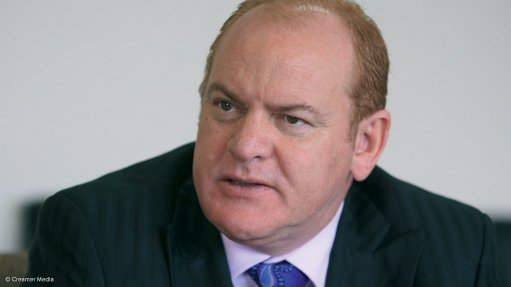
Nick Holland
Photo by: Duane Daws
JOHANNESBURG (miningweekly.com) – Plans being fleshed out by South Africa’s Chamber of Mines (CoM) in liaison with government for a centre of excellence were poised to take mechanised mining to the next level, Gold Fields CEO Nick Holland said on Tuesday.
But in the meantime, the going continued to be tough in the mechanised arena where a skills dearth was retarding progress.
Responding to Creamer Media’s Mining Weekly Online at the African Mining Network in Johannesburg, Holland outlined how Gold Fields had found it difficult to introduce mechanised mining at its wide-orebodied South Deep gold mine, which is struggling to break even.
He disclosed in response to Cadiz mining head Peter Major that the CoM’s proposed centre of excellence, which would retrain and re-equip people with the required skills, would likely ease the introduction of mechanisation in the future.
But in the interim, Gold Fields had seen fit to negotiate this year’s wage agreement outside of the CoM’s traditional collective bargaining framework in order to attract and retain the right skills for mechanised mining.
Earlier this month, the JSE- and NYSE-listed company reached a generous agreement with the National Union of Mineworkers and the Uasa union to pay increases of 10% a year each year for the next three years to the 3 500 people that it employs at its fully mechanised South Deep mine, 38 km west of Johannesburg.
Holland disclosed further that South Deep was also having to go outside of the conventional mining arena to find suitable mechanised mining candidates.
“Trying to retread conventional miners into mechanised mining doesn’t always work too well,” said Holland, who added that the company’s response was to use its new competitive pay package to recruit the right young people and put them through thorough training programmes.
Conceding that it would take time to train, he said it was incumbent on Gold Fields to “do it right” rather than quickly, given South Deep's 100-year orebody longevity.
While there was no doubt that at South Deep mechanisation could do in weeks what conventional mining, using multiple crews, would require months to do, many orebodies that lent themselves to advanced mining methods were being held back by insufficient expertise.
In November 2013 CoM head: safety and sustainable development Sietse van der Woude told Mining Weekly Online that plans were at an advanced stage for the centre of excellence in mine health and safety and that the activities of the centre would dovetail with the introduction of innovation and completely new ways of mining that a number of mining majors were developing.
A team from the Mine Health and Safety Council (MHSC), the statutory body tasked with establishing the centre, had at that stage undertaken a study tour of global institutions with the aim of facilitating South Africa’s transition to sustainable mining through innovation.
Mainly to fund mining research, mining companies pay R40-million to R50-million a year to the MHSC, which is governed by the Mine Health and Safety Act and which is made up of five employer representatives, five labour representatives and five State representatives.